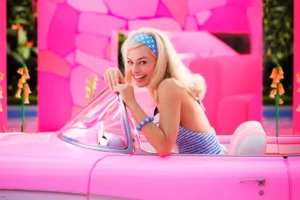The world is pink. The houses are pink and perfect. Margot Robbie floats effortlessly from the roof to the pool, gliding across the plastic water to the soundtrack of Dua Lipa and Charli XCX. You are in Barbie World, for me, the definitive film of last year.
This year’s big-screen debut of the monster ‘Barbie’ franchise was set up to be the film of the summer, and it somewhat delivered, and whilst it does have some flaws, the casting is not one of them. Margot Robbie truly is Barbie. There is not one thing she could have done to improve her performance. It is so easy to forget she is acting because, with the immersive nature of the world built in this film, she feels very real and authentic to the story. Robbie’s talent is only bolstered by the supporting cast, with Ryan Gosling’s performance as Ken being nothing short of outstanding. He really did have a unique and captivating (k)energy that draws the eye whenever he’s on screen, he stands out but doesn’t overpower, and this makes for a really entertaining watch, especially in the musical number I’m Just Ken. The rest of the ensemble cast was what made the world feel so immersive, in each scene, everyone had a clear role and personality which really brought some authenticity to such an absurd script concept.
In fact, every aspect of production in ‘Barbie’ was near flawless. The ‘world’ of ‘Barbie’ was what made this a successful film, and from the music to the costumes, every new detail hooked the audience more. The only aspect that felt lacking was the writing, and this brought the movie down monumentally. The storyline was simple, which worked in many ways to allow flexibility and creativity in the production, however, it did leave confusion in its wake, jumping to the next plot point with little to no explanation. For example, at one point Barbie’s mother states that they must return to Barbieland to fix everything, and there is no explanation as to how she would know to do that. Of course, this could likely be explained as meta-writing – perhaps it was a writing choice meant to emulate how a child may play with dolls and create fun storylines without regard for real-world logic. But, these jumps made the emotional beats concerning the mother and daughter to be a little lacklustre, as they felt manufactured, as though the moments were not really earned by either character. Director Greta Gerwig’s usually introspective, reflective and implicit directional style could have really helped here, but instead, she went for a more explicit, clear style for this film, which does work well for the comedic moments, but compromises on emotional weight and sometimes confuses the messaging.
The message of the film was positive if a little simple. For a feminist message, it was very plain and straightforward, and at times did verge on ‘Girlboss Feminism’, painfully ignoring notions of intersectionality. That being said, this is a Hollywood film made for a young audience so a deep monologue dissecting the works of Simone De Beviour and Judith Butler was never to be expected, but it did feel a little like the writers were avoiding taking a true stance to bring in a wider audience. To illustrate the confusion with an example, it was very unclear why the character of Barbie chooses to enter the ‘real-world’ at the end, she is willingly entering and participating in patriarchy, which undermines the earlier anti-patriarchy messaging.
Musically, ‘Barbie’ was far less messy, in fact, the hit-packed soundtrack of Chali XCX, HAIM and Dua Lipa, amongst others, brought so much life and energy into the film. It really added to the fun and lightheartedness, whilst also being a vehicle for the message of the film to be conveyed, for example, in the beach guitar scene. The music brought out the fun in the scenes, and this is what made ‘Barbie’ an enjoyable watch despite the plot confusion – a particularly fun moment was the montage of patriarchy as Ken enters the real world, as it managed to satirise the issue in a very digestible way. So, ‘Barbie’ may not go down as an all-time classic in the same way ‘Mamma Mia’ is because there isn’t a high rewachability factor, but it definitely dominated and defined the summer of 2023.






